California Road Trip 2012 [part 4 of 4]
Aug 9 – Day 14 – Mimics and an unexpected return to LA
At 5am, Thomas and I left the house and quickly grabbed breakfast on our way to Dana Landing. When we arrived, Thomas’ friend Gary was already there with the boat ready to launch. Thomas and Gary fished together often and their launching procedure was quick and smooth. In no time, we were ready to head out of Mission Bay.
The waves were a little rough on this cloudy morning for the bay boat, but it just meant we would head out of the harbour at a slower speed. Once outside of the harbour, we went full throttle toward La Jolla. Our game plan was to fish La Jolla for a bit near the kelp beds, then find some rocky spot for rockfish.
Gary and Thomas started fishing for Kelp Bass while I tied on a dropper loop rig to look for new species on the bottom. Nothing wanted to bite my squid, but Gary and Thomas were doing well on Kelp Bass using swimbaits. At times, I was tempted to join them. However, I remained steadfast on my species hunt and continued to fish the dropper loop. After an hour of fishing for Kelp Bass, Gary was satisfied and we went to look for some rocky bottom.
At first, we looked around La Jolla for some deep rock bottoms. We were fishing in 200 feet of water. On our first drops, we caught a few Pacific Sanddabs. It indicated that we were on some sandy bottom. Thomas had never tried Sanddabs before. Being a personal chef, he immediate thought how to cook these little fish. We kept 3 larger ones that Thomas would cook up later. Along with these Sanddabs, we also caught a few Halfbanded Rockfish (Sebastes semicinctus) – new species #34. Initially, I thought these were juvenile Chilipepper Rockfish. However, the two bands on the rear end of the fish suggested they were HalfBanded.
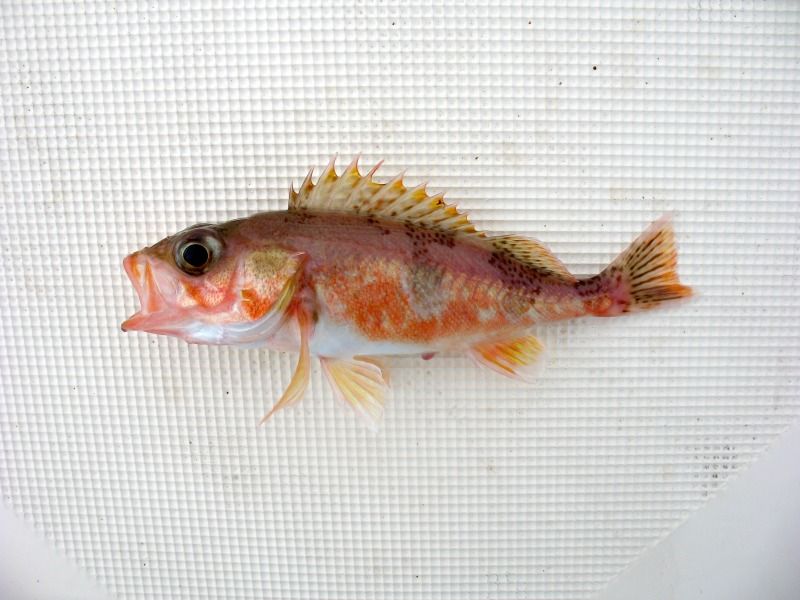
A few drops and a couple of Sanddabs later, I finally had a slightly bigger fish. I initially thought this rockfish was a Greenspotted Rockfish. However, upon closer inspection at home, I suspected that this should be a Freckled Rockfish. Dr Milton Love had a look at my picture and also agreed it was a Freckled Rockfish (Sebastes lentiginosus) – a bonus new species #35!!! Sometimes it pays to take pictures of every fish you caught…especially when some of your fish display similar marking and colourations to each other.
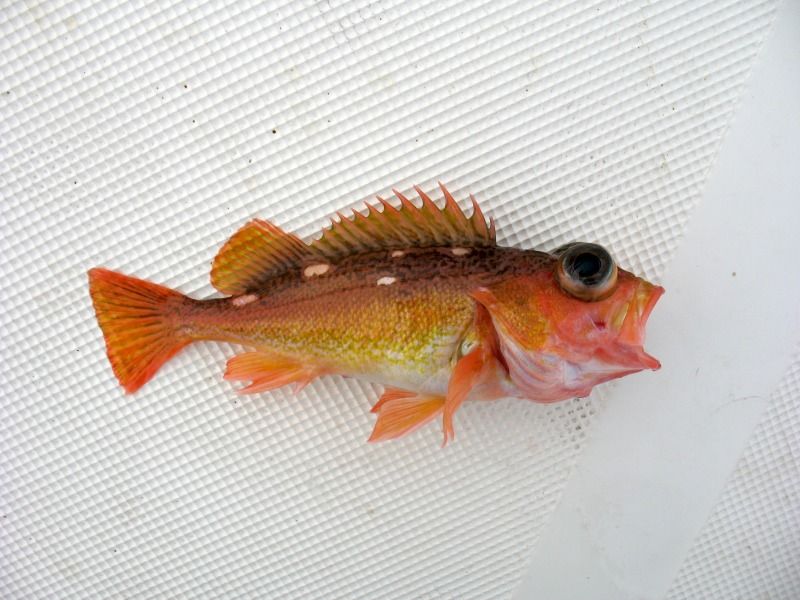
I had mentioned to Thomas and Gary that I had never caught a California Lizardfish before. They said the Lizardfish could sometimes reach epidemic levels such that all you may catch are Lizardfish. However, none of us expected that I would catch two lizardfish halfway on the drop! The Lizardfish bit in about 100 feet over 200 feet of water and I had a double on Lizardfish on the same dropper loop rig! Aggressive little feeders, I could see how they can be an annoyance. Luckily, once I crossed off this species, we didn’t encounter them for the rest of the morning. California Lizardfish (Synodus lucioceps) – new species #36.
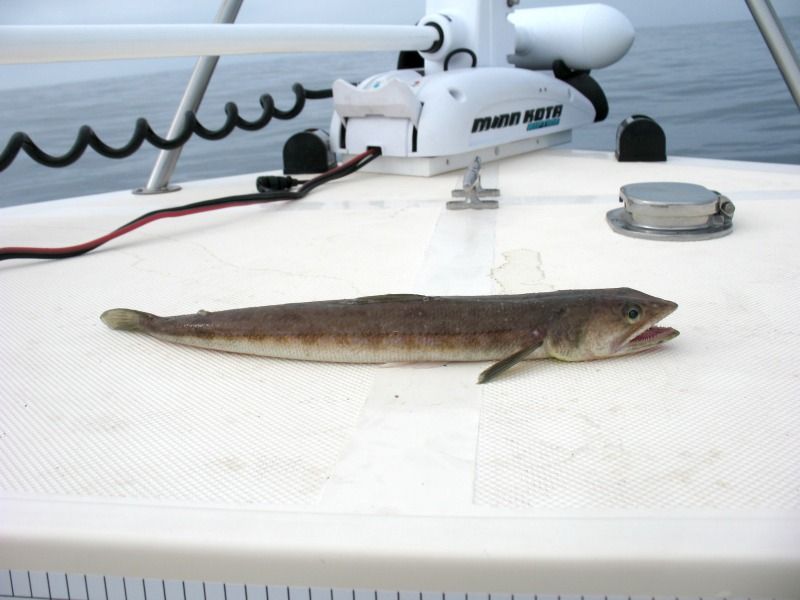
Our area stopped producing any rockfish and only small Sanddabs were biting. Thomas suggested to look at one area he had been wanting to try just outside of Mission Bay.
A short ride later, we were watching the sonar in 120 feet of water searching for any rough bottom or any humps. Circling around the general area, we finally found a hump that rose from 100 feet to 70 feet. By this time, the water had calmed down and we could slowly drift over the small spot. Even so, it only takes a few minutes to drift over the spot. It was a tiny hump.
Small as it may be, it held fish. When we drifted right over the rocky hump, the rockfish began to show themselves. We were soon catching some rockfish. I thought I would take a better picture of a Greenspotted Rockfish since the sun poked out of the cloud. It was good I took another set of pictures of this fish since this was the real Greenspotted Rockfish (Sebastes chlorostictus) – new species #37. I would have missed this new species if I had not taken extra pictures (since the previous fish was a Freckled Rockfish instead.) The Greenspotted Rockfish has smaller round green spots on a slightly lighter coloured back. The markings tend to look more uniform and regularly connected instead of the irregular vermiculations found on the Freckled Rockfish. I also noticed that the pictures of Greenspotted Rockfish on reputable sources shows a white edge on the upper and lower lobes of the caudal fin while the Freckled Rockfish shows an orange edge.
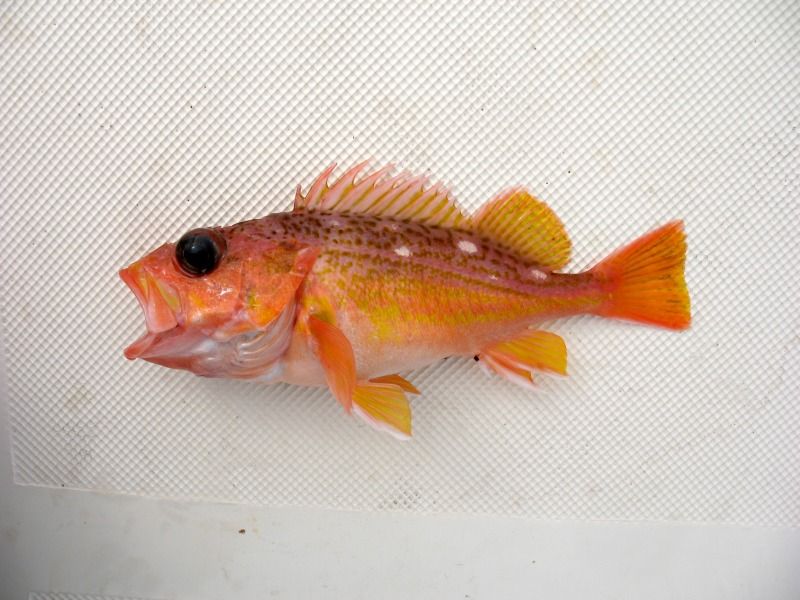
A few more drops later, I caught a real Rosy Rockfish (Sebastes rosaceus) – new species #38. Again, I recorded this extra species with the aid of extra photographs of fish since the fish I caught on the Gentleman ¾ day boat was in fact a Greenblotched Rockfish. They look extremely similar, and in fact, it took Dr. Love’s expert eyes to distinguish the two. The Greenblotched has green markings on the back while this is lacking in the Rosy. Both the Rosy and Greenblotched Rockfish has pink-purplish marking on the head and nape areas. They look extremely alike!
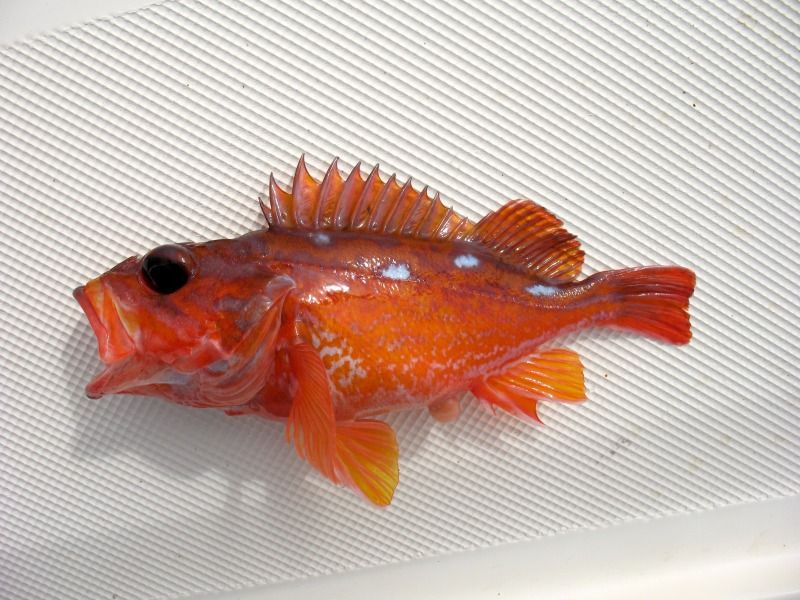
Meanwhile, Thomas and Gary were competing with my species hunt but catching a Yellowtail Rockfish and a Blue Rockfish, both species that I had yet to catch. Here’s Thomas’ Blue Rockfish. It was surprising to find this fish south of their typical range and feeding on bottom as opposed to suspended.

When we drifted off the rock, we would reset the drift. The lack of strong current and wind allowed us to drift slowly over the rock and we capitalize on the opportunities.
On the second last drift, I hooked into another red bodied rockfish with white spots. This one was a Honeycomb Rockfish (Sebastes umbrosus) – new species #39. This one was much easier to identify from its related species by the honeycomb-like patterns on the side of the body due to dark edges on the scales.
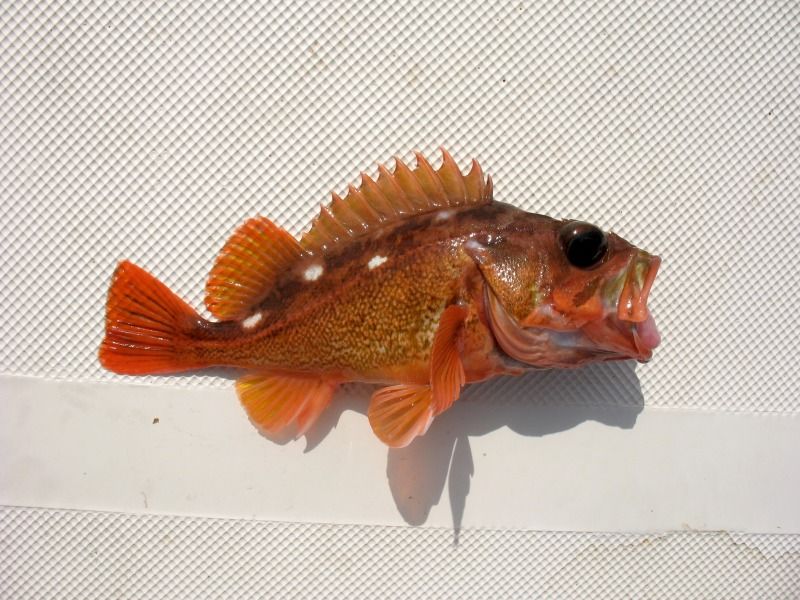
After about an hour, the fish stopped biting. At about 12pm, we decided to call it day and headed back to the launch. Strangely, Dana Landing and a couple of other San Diego launches do not have wash down facilities. Gary had about an hour drive and a wash down at home so he left promptly. Thomas and I went for a Mexican burrito lunch before going home.
We were chatting about the plans for the next day to go offshore in search for Yellowtail. It was then that I realized I had left my passport at my aunt’s apartment and the Yellowtails were in Mexican waters. So the decision was quickly made for me to get my Mexican fishing permit, then drive to LA to get the passport, and return to San Diego in the evening. Initially, I had planned a fishing session with Kevin that evening. It was very unfortunate that I had to cancel so I could drive back to LA to retrieve my passport…even more so when you read below. So very sorry I couldn’t fish with you Kevin!
The rest of the day was just time on the road. I was caught in a bit of rush hour traffic and didn’t get back to my aunt’s apartment until 5pm. After a quick 1.5 hour nap, I was back on the road toward San Diego. Again, I was caught in the tail end of rush hour and I didn’t get back to San Diego until 9pm. I got my passport though, so all was good, right?
When I got back to Thomas’ house, Thomas gave me some good and bad news. The good news was that there was a fresh report where people encountered Yellowtail just 30 miles out of Mission Bay in US waters. The bad news was that a meeting between US and Mexico government to resolve the visa issue was not decided, and there were no visa being sold on that day, such that we would not be able to fish in Mexican waters. Thomas and his friend Craig did well at the Coronado Islands in Mexican waters on Wednesday and most of the fish were caught on kelp paddies in Mexican waters. We were now limited to finding fish either offshore outside of the Coronado Islands or within US waters.
I guess our game plan was complicated by several factors. For starter, Craig owns the boat with a partners and fishing at the Coronado Islands without proper visa could risk boarding by the Mexican coast guard and subsequent fines or even confiscation of the vessel. Then, seeing as I was a Canadian citizen far away from home, and so was Michael who were to join us tomorrow, we really didn’t want to get into any issue with Mexico. In addition, the chance of finding fish on offshore kelp paddies would require more gas in Mexico waters as compared to searching for them in the US waters. Thus, we decided to fish in US waters the next day.
That night, Michael (a friend of mine in Toronto who conveniently were also visiting San Diego the same time that I was) arrived in San Diego. He had some trouble finding Thomas’ house and arrived fairly late. After a quick dinner of fresh yellowtail sashimi and yellowtail poke courtesy of the skillful Thomas, all of us were in bed before 12am. We had a day offshore waiting for our attention.
Aug 10 – Day 15 – It is a big ocean out there!
Michael had never fished in the ocean. I was excited for him since this would be his first ever saltwater experience. I still remember the first time I fished offshore on my friend Todd’s boat in Hawaii. The anticipation was almost to great, so I could just imagine how Michael would feel.
While Thomas met with Craig to fill up the boat, Michael and I went to grab some breakfast and coffee before getting to Dana Landing. We arrived just a minute before Thomas and Craig arrived. After a quick hello, we started loading up Craig’s 21-foot boat and prepared for launch. I got on the boat to help Craig prep the boat while Thomas backed the trailer. Another smooth launch later, we were slowly making our way out of Mission Bay. As soon as we were out of Mission Bay, we felt the short 2-4’ swells that would build on this day. In the morning, the wind was light and there were hardly any wind chop. Our plan was to head out 15 miles at a good speed before slowing down to start searching for kelp paddies. This was the third trip for Craig on his new boat and it was a good shake down offshore run for Craig.
The ride was smooth for most part aside for the occasional swell that we could not dodge. Thomas was lying down in the cubbyhole just under the helm to test out his seasick comfort station LOL. Several times, Thomas was bounced around quite well when we hit a few waves.
Finally, we reached our starting point and a few trolling feathers were sent out. While searching for kelp paddies, we trolled hoping to pick up a fish on the blind. Between Michael and I, it was our job to search for kelp paddies on the tower. It was interesting that this job were given to a couple of kelp paddy fishing noobs since we really had no idea what to look for. Most of my past experience was looking for bird piles or porpoises since kelp paddies were not found in Hawaii. On a cloudy day, the water took on a deep blue that made it difficult to look for the low-lying kelp. Thomas taught us to look for calm slick on the water (since a pile of surface debris would prevent chop from traveling through the debris and calms the water right around the debris). He also said it would be good to look for birds sitting on the water since they could be sitting on a kelp paddy. Most importantly, kelp would appear as a small green patch of colour against the blue ocean, although it would be harder to see this when it was cloudy. Personally, I found it most effective by looking at a 45 degree angle to the path of travel. I scanned up and down along this 45 degree path to search the face or the crest of swells and wind waves for any indication of kelp. I found that this systematic method worked well for me, much better than scanning the entire area and missing a kelp paddy as I look away to scan another area (which had happened prior to changing to my method).
We started looking for any signs of kelp. Thomas was the first to find a strand of kelp in the water and it gave Michael and I an idea of what to look for. It took a long ride before I spotted a buoy in the distance. This ended up being a long gill net set by commercial fisherman that had no fish associated with it.
Another 20 minutes passed before Michael found another couple of kelp strands that we did try for a quick 5 minutes. No one was home on this small bit of kelp.
I then saw a gull sitting on a patch of slick water, but upon closer inspection, the gull was just sitting on a current break where and eddy had likely formed.
We decided to make a move in the 270 degree direct. When we moved off, we found less and less indication of kelp. An hour later, I finally saw another small strand of kelp that we decided was not worth our time. It was a good sign to finally see another bit of kelp though. Kelp often built up where two current meets and where you find some kelp, you are likely to find more. Another 15 minutes passed when I spotted a bit of green on the face of a wave. I stomp on the roof of the cockpit to notify Craig and Thomas came out to see a paddy that worth at least a try. This kelp paddy was just slightly bigger than a study desk, but on this slim picking day, it was something we couldn’t pass by. Thomas threw out a few live sardines and chunked a few dead sardines to see if anyone was home. He pinned a sardine by the nose, casted out the Saltist 40 and passed the rod to me. This was the first time I flylined a sardine toward a kelp paddy, so I was not sure if I was doing it correctly. Thomas said I should keep just enough tension to let the sardine swim off, but not too much slack in the line. As the boat drift around the paddy, I had to point the rod tip toward the paddy and walk around the tower to follow the bait. Craig also had a sardine out but neither of us was receiving any attention after 5 minutes of soaking. Craig decided to start the engine and we slow trolled the sardines around the kelp for a couple of passes before moving on. Thomas said that in truth, the paddy was too small to hold fish, but you just never know so we checked it out.
Michael and I went back to looking for paddies. Instead of paddies, we found a pod of whales. Michael had never seen whales before so this was a great experience for him. Craig even took the boat closer to the whales so Michael could have a better look (rest assure people…we were still keeping a distance away from the whales).
When we went back to searching for paddies, it took another 30 minutes before I saw another bit of kelp poking at the peak of a swell. This kelp paddy was the size of a large dining table and this was the biggest patch we’ve seen all morning. The kelp paddy looked really good from a distance. I said to Michael “All we needed was one good paddy.”
Thomas started chunking when we were still a good 40 feet away. He also tossed a few sardines at the paddies. We didn’t see any fish coming out of the paddy at the bait. Thomas nose hooked a sardine on the baitrunner rod and handed the rod to Michael while Craig fished another freelined sardine on the Saltist. Another 5 minutes later, the sardines were still being ignored. It was a bit disheartening that this great paddy sitting in 74 degrees water didn’t held any Yellowtail or Dorado. We didn’t even bother to slow troll the sardines around the paddy. We just took off. Back we went to look for more paddies. Although the fishing was tough, Michael and I were just having a blast on the tower.
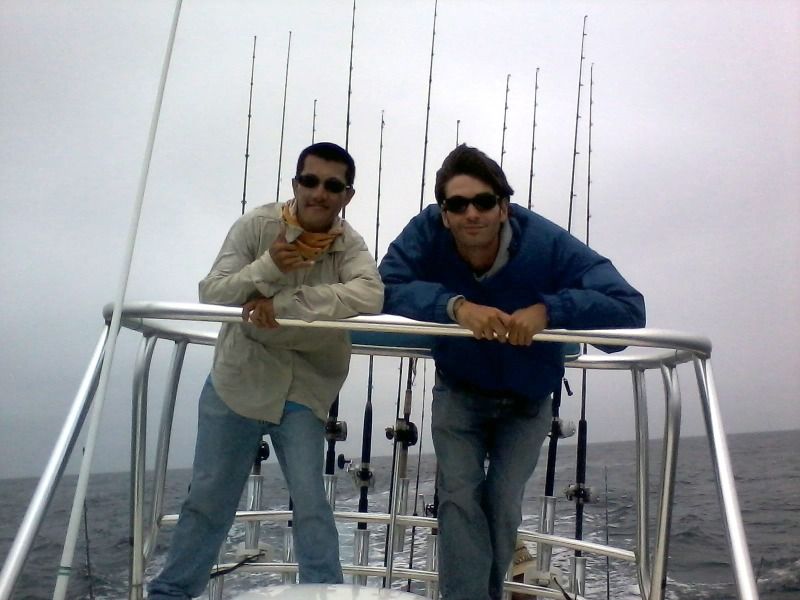
We didn’t see any more paddies, but we did find one Fin Whale close enough to us. My camera was in the cockpit and I didn’t get any pictures. This was one from Thomas.
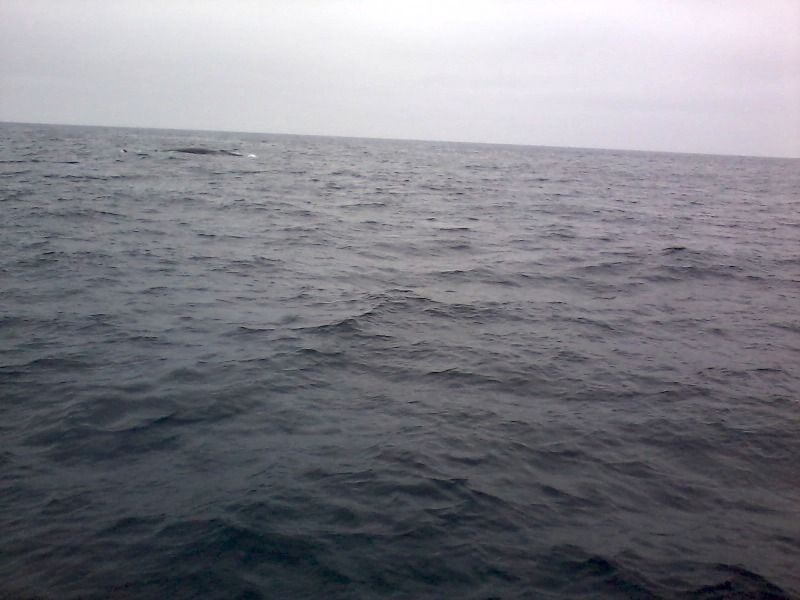
By 10am, we decided that it was a lost cause search for the few and unoccupied paddies. So we headed back to La Jolla to soak a few live sardines hoping to hook up some home guard Yellowtails, or perhaps a White Seabass. We got a couple sardines in the water but soon found that the water was too dirty and the lines were often fouled by sea grass or kelp. It was too difficult to drift some baits, so we decided to fish on some rocky bottoms so at least we can get Michael a few new species.
Just like yesterday, we searched around the La Jolla but we didn’t get any action. Thomas suggested that we fished the same rocky area we found yesterday. The only issue was that the GPS coordinates were saved on Gary’s GPS LOL. We did find the area again but couldn’t find the same hump we fished yesterday. Nonetheless, we sent some dropper loop rigs to the bottom and soon hooked up Sanddabs, and various rockfish. I’ll let Michael report his catches. Thomas was fishing a sabiki rig since I told him we would be fishing for Leopard Shark the next day and he was trying to jig up a few mackerels for me. Aside from a few good size Pacific Jack Mackerels, Thomas also caught a Sardine! He asked me if I would like to fish the sabiki for Sardine. I really should have given it a go, but I was determined to fish the dropper loop for a Blue Rockfish or a Yellowtail Rockfish (since I know they are in the area). To tease me a little, Thomas caught a Yellowtail Rockfish on the sabiki! He was catching my target species again!
I caught some more Halfbanded Rockfish, Greenspotted Rockfish and Rosy Rockfish. Just as we were going to call it a day, I set the hook on yet another rockfish. When I saw the brown back with white blotches and some yellowish fin, I was getting excited. Once the fish was in the boat, I could see the pinkish tinge on the pectoral fins, the black blotch between dorsal spines 8 to 12 and counted 8 anal fin rays. YES!!! It was a Yellowtail Rockfish (Sebastes flavidus) – new species #40!!
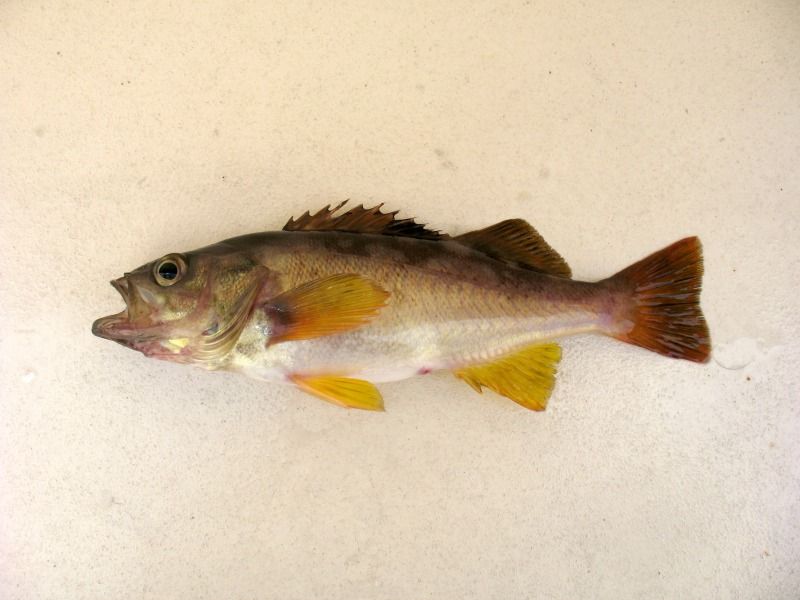
After landing the Yellowtail Rockfish, we decided to call it a day. Again, we were at Dana Landing and there was no wash down facilities. I felt bad that Craig had to wash down the whole boat on his own. Craig, on the other hand, felt bad that our original plans to fish the Coronado Islands for Yellowtail had to be changed and we ended up not finding any of them offshore in US waters. But that’s how offshore fishing goes. You never know where fish may be from one day to another. Fish could move in and out of an area, or completely turn off fishing if conditions change. Craig gave Michael and I an invite to return to San Diego any time to fish with him again, as soon as the Mexican visa issue is resolved. Craig was rather impressed that we spotted quite a few paddies on such a tough day, especially since we were both new to paddy fishing. I was glad I made a new friend with a boat to fish for pelagics LOL.
After Craig left, Thomas, Michael and I went for some tacos. This was the first time Michael had fish tacos.
After lunch, I just needed a little nap. Fishing offshore certainly takes a toll mentally and physically. However, I wanted to get Michael on a few more San Diego species, so we only took a couple hours of nap and we were ready to head out again at 5pm.
I had a spot in Mission Bay in mind where it could yield multiple species. We didn’t have any bait, but Thomas gave me some squid strips, the fresh dead sardines leftover from the morning and some parboiled sand crabs.
It was a just a short drive to the spot since Thomas’ house was located near the airport. I did have to search for the location again since I took a wrong exit and ended back at Dana Landing LOL. However, we soon found our way and arrived just after high tide.
The tide was dropping so there was a bit of water movement. We sent out three rod. Michael and I each fished a 7’ rod with a Carolina rig and parboiled sand crabs. I also sent out half a sardine on a 5/0 circle hook on the 12’ surf rod. The bites were far and few in between. However, Michael had a tap on his rod and landed his first Barred Sand Bass!
A while later, I heard my baitrunner went off and had Michael grab the rod and did a typical hook set. However, I was using a circle hook and the hook did not set.
I baited with another pieces of sardine and it took another 30 minutes before we got a good run. Michael took the rod again. This time, the fish was really running with the bait. When Michael tightened the line and applied some pressure, he said he felt the fish on the line…but then it all went slack. After reeling in the bait, we found the hook point was pushed back into the bait and the hook never set. Darn!
It then went quiet on the long rod. Michael landed a couple more Sand Bass. I was hoping that we would find a Spotted Bay Bass for Michael, or some other possible Mission Bay species such as Sargo, White Surfperch, Yellowfin Croaker, Spotfin Croaker…or maybe even a Lizardfish.
The sun was setting and the bit on the sand crab died. We were chatting with someone who used to browse on SCSF but he had not been on the board for a year. After he left, I was just commenting that nothing was going on with my long rod when it went off. This time, the fish picked up the bait, took a short run and dropped it. I took the rod in hand. I felt the fish picked up the bait again and ran left about 10 feet before dropping the bait. It never came back for a third bite. It might have been a shark…either a Leopard Shark or a Smoothhound Shark.
Since it was now dark, I said to Michael that we should switch the light rods to squid so we could perhaps catch some sharks or rays. As if it was magic, it took all of 5 minutes before the rod went off. Michael was over excited and botched the hook set. A fresh piece of bait was put on but then the other rod went off. This time, Michael set the hook properly and a nice little fish was on the other end. When we got it close to shore, we saw that it was a baby Bat Ray…and Michael’s first Bay Ray!
After a quick CPR, we rebaited with squid a third time. Another 10 minutes passed when Michael’s rod had another fish and it was a second baby Bat Ray.
For some time, I noticed the occasional tiny twitch on the long rod’s tip. The baitrunner never went off, but something was bugging the bait. I thought it was either a crab or lobster ripping off bits of sardines. Since we were busy landing bat ray, I left the long rod alone. When I noticed that even the rod tip stopped twitching, I should check my bait to make sure it was still there. I started reeling in my line and felt rig tangled in the eel grass bed. When I finally got the rig out of the grass, I noticed a little wriggling on the line. I thought it might have been grass fouled on the line causing the pyramid sinker to swing on the retrieve. When I had the rig close to shore, I saw something splash on the surface and realized I had a fish on the line!
By complete luck, I caught my first Thornback Guitarfish (Platyrhinoidis triseriata) – new species #41! I guess it was good I was using a circle hook since the fish must have swam against the weight of the sinker and the hook set itself. I was actually surprised that this 17” fish did not pull any line. I’d take a lucky catch any day!
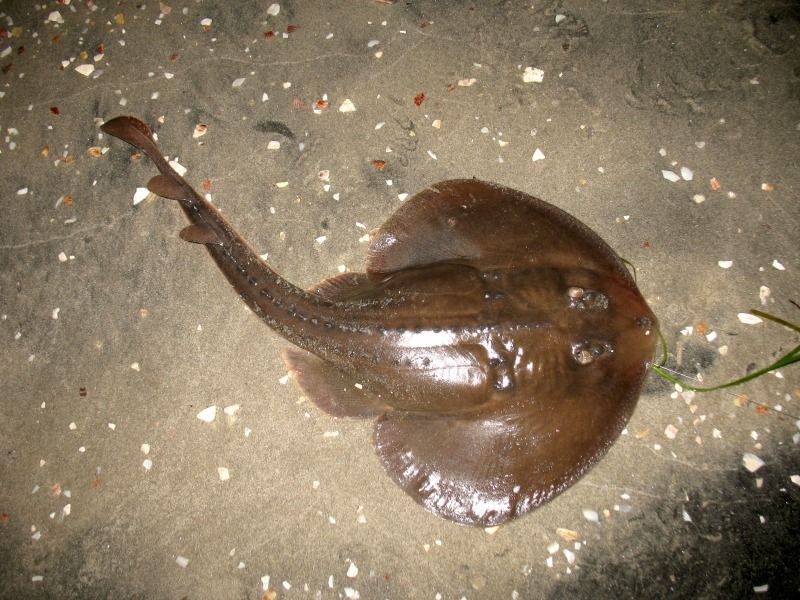
By about 9pm, the tide had bottomed out and reached slack low. We watched the Sea World fireworks just before leaving for Thomas’s house. It was great to add 2 more species for Michael.
When we got back, Thomas was preparing dinner. He made yellowtail sashimi and yellowtail poke and we also had some salad and rice. Everyone was pretty tired after a day of fishing so we all went to bed soon after dinner.
Aug 11 – Day 16 – Meeting an old friend for the first time.
Michael and I had a surf session this morning. We were to meet with Kaipo and Elijah in the Carlsbad area at 6:30am. I was especially excited since I would be meeting an old friend for the very first time.
You see, about 5 years ago, Elijah found one of my Hawaii fishing report on a Hawaiian fishing website. Elijah was living in the Bay area at the time while I was living in Toronto. At the time, he was interested in the fishing opportunities in Hawaii, especially for Peacock Bass. After conversing over email, I found that we shared mutual interest in traveling and fishing. We had the same ideals and detailed approach to fishing. We started sharing more techniques and even started sharing GPS coordinates for specific species targets. Soon, we were talking about taking trip together some day. Strangely, we discussed planning overseas trips together before we had even met or spent a day sharing the waters.
It was a mix feeling to meet someone whom I had become so familiar with for the very first time. Fortunately, all the anxiety was for naught since Elijah was the same great personality online as he was in person. We quickly rigged up our rods and took our first fishing adventures together.
Before we left our parking spot, Elijah said he would be searching for his first Corbina today. Just a few days ago, Elijah had hooked into a small Corbina and lost it in the surf zone. I said that it would be an absolute pleasure to be there for his first Corbina. We got down to the beach and met Kaipo. Kaipo and I had been chatting a little about fishing in Hawaii. He gave me an invite to fish the Carlsbad area to try for a Spotfin Croaker. So it was with great company of Michael, Elijah and Kaipo that we explore this stretch of beach for Corbina and Spotfin Croaker.
Michael had never fished in the surf so I helped him get started. We looked for sand crabs and found some thumb-sized crabs. I collected a full pocket of big sand crabs and started fishing. Before I even got into the groove, I saw Elijah hooked up! Oh yeah! It looks like a good fish too!!! I got closer as the fish the tired and it was a Corbina! I was so stoked, but also anxious for Elijah at the same time. The fish was in the surf zone, the danger zone. But it was a lot of worrying for nothing since he surfed the Corbina up the beach like an expert. Awesome….completely awesome!!!
We got back into fishing and I felt a little tap-tap. My sand crab came back half eaten. That’s a sign of some Surfperch in the area. I switched to a smaller hook and picked a jellybean-sized sand crab from the sand. After a couple of drifts, there was a solid take and I pulled in a Barred Surfperch. Since Michael had yet to catch a fish from the surf, I suggested for him to change to a smaller hook and put on a 2” plastic grub. It didn’t take long before Michael caught his first Barred Surfperch. Wicked!
I went back to fishing a large hook and large sand crabs. On one cast, my sand crab was just coming in with the waves when I felt a little tap. It was strange to get hit so close to shore in such skinny water. The fish couldn’t give much of a fight since there was little water to swim in, and to be honest – it was small. It did solidify a confirmed Leopard Shark catch for me. That little shark could barely fit the sand crab in its mouth, but it was fair hooked on the lower jaw!
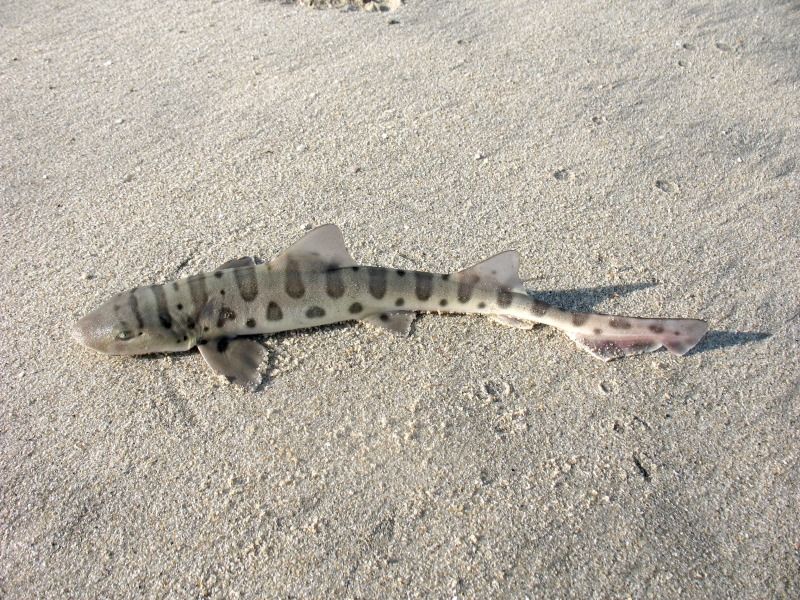
Between Kaipo, Elijah, Michael and I, we leap frogged down the beach hoping to find more big fish action. However, we worked hard for nothing more. We decided that it was time to fish a different beach.
A short drive down the highway we reached a beach a little south. Kaipo said this beach is good for Crobina and it is a good beach for a bit of sight fishing. At the beginning, we really don’t know how we could sight fish in that water. However, Elijah and I soon figured out that we need to look for flatter areas on the beach where the water is shallow, causing the waves to flatten out and the sand to settle. This gave us windows where the water calms and clears and good visibility to search for these ghosts.
Steve was also on the beach looking for Corbina.
It took at least an hour before I spotted my first Corbina in the skinny. It was so ridiculously cool seeing that fish swim in the shallow. The entire time I had my Carolina rig casting into a pair of deep holes within a nice trough. I thought the fish might be sitting in the holes waiting for the right surf to charge the beach. I soaked a large sand crab for a long while without getting hit, but seeing the Corbina swimming in the vicinity told me I had the right idea.
Letting a bait soak in one spot trying to catch a randomly cruising Corbina was just the wrong technique though. Based on everyone’s lack of action fishing the trough, the fish were just not feeding in the deep water. They were coming onto the beach to feed on the sand crab beds. You could sit a bait on the bed and hope for a Corbina to find it, but that is a really low percentage game unless a fish is consistently feeding on the same bed. The only way to get these fish was to pitch a sand crab to fish that you spot, similar to flats fishing for bonefish.
And just like flats fishing for bonefish, it was much easier said than done. By the time you spot a fish, it was likely on the move. Even with the rod at the ready to cast, bail open and line on your finger, there was little time to make that cast. The surf environment is even more unpredictable than a calm flat. The fish could be visible one second but then disappear under white foam on the incoming wave in the next second. If, and that’s a big if, you made that cast and lead the fish with the sand crab, the waves again introduce some uncertainly. There were a couple of fish where I made the cast leading the fish, but either an incoming wave or an outgoing wave washed the sand crab around and the window of opportunity was lost. Like always, you cannot cast directly at a fish since that would spook them immediately. Sight fishing for Corbina was extremely difficult, but so very addictive! Kaipo, Elijah and I spent over 3 hours just looking for Corbina to cast to. And since the tide is constantly changing, what was a good flat one moment could be unfishable another 15 minutes later. We did a lot of walking often looking for a new flat to fish. Michael, on the other hand, stuck to the pair of holes I started at and fished that area hard. He did see a pair of Corbina in front of him and a pair behind him on the incoming wave.
By 12pm, there were just too many people on the beach on this Saturday. We were just about to leave when a Game Warden showed up to check our licenses. It felt good to present my non-resident licenses LOL. We chatted for a little bit and he welcomed me to California and wish me luck for the rest of the trip.
At 1pm, we decided to call it a day. We were hungry, but most importantly, we wanted to explore other areas for other species of fish. We bid farewell to Steve and Kaipo and left them on their quest for Corbina.
We took our time having lunch. We were waiting for the tide change since high tide was at around 2pm. After lunch, we bought some ghost shrimp and razor clams. I also picked up 2 small sand spikes. In 2008, I visited Angler’s Choice in San Diego and found a small packable sand spike. I had not been able to find them anywhere else. It was great to find that these were still available at the store and I grabbed the remaining two in stock LOL.
Now, the difficult decision began. Elijah mentioned a few spots he knew where there were opportunities for variety of target species. One spot he mentioned could yield bonefish. I already a plan the next day to fish for bonefish, but I thought it would be fun since all three of us were after our first Eastern Pacific Bonefish. Elijah also mentioned that the area Haller’s Round Ray, Butterfly Ray and Smoothhound Shark, all of which were my target species. Thus, we headed over to the location to spend the afternoon.
Michael and I initially fished from the same spot, however, I suggested to Michael that we should spread out along the shoreline to cover area. I took Michael’s spot since there was a little bit of beach where I could put my sand spike for the long surf rod. Michael moved about 20 feet to the left of me while Elijah was another 30 feet from Michael to his left.
I cast out a piece of sardine for the long rod and a ghost shrimp on the lighter rod. Michael was also fishing ghost shrimp but using a smaller hook. He was the first to get a strike but missed the fish due to the smaller hook. I suggested that he should make a switch for a large hook and he drew first blood on his first Haller’s Round Ray. Elijah also caught a ray while my rods were silent. Finally, as I was setting up a second light rod, I got a hit and caught my first Haller’s Round Ray (Urolophus halleri) – new species #42.
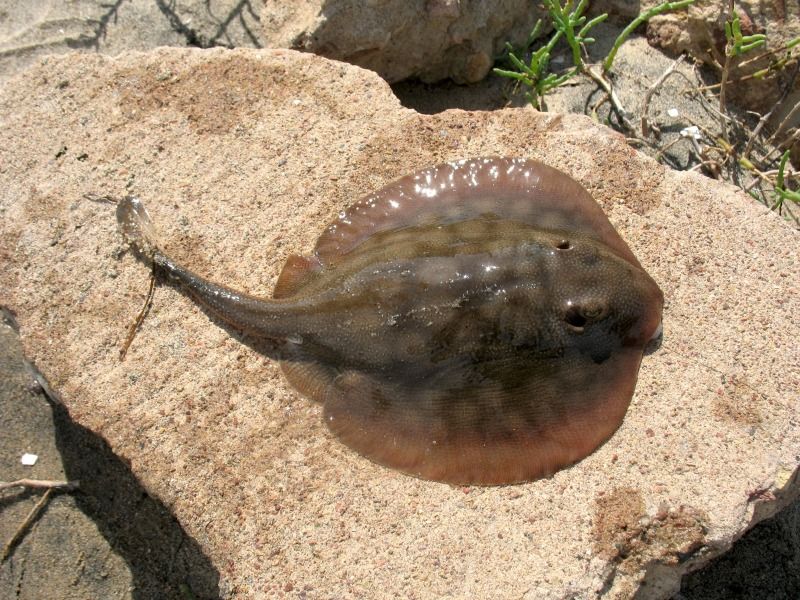
These little rays had a stinger near the end of their tail. You really had to watch out when handling them. Usually, we flipped them over on their back and use the rod butt to hold the fish down while unhooking the fish with hemostat. I usually just nudge the fish back into the water with my rod butt. The further my hands from the fish, the less chance that I would get jabbed.
It seemed like all we could catch were these Round Rays. However, I broke the monotony with a Shovelnose Guitarfish.
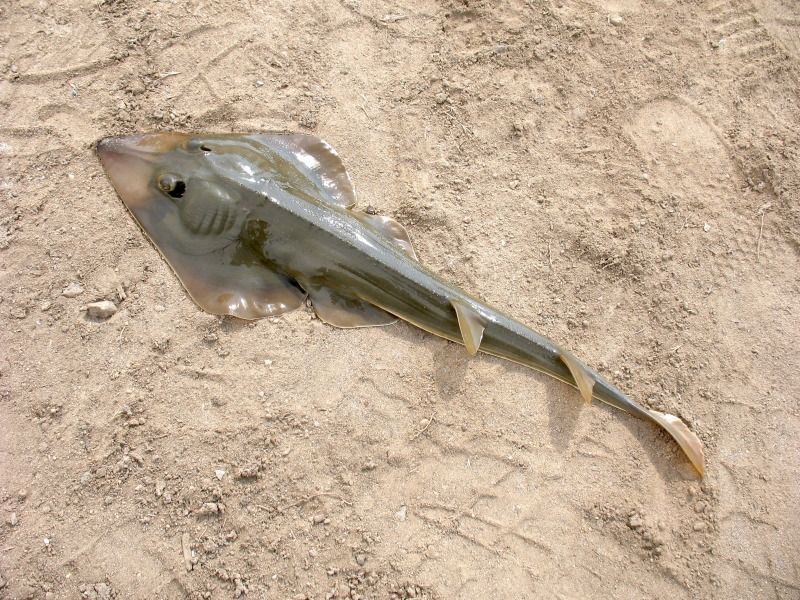
Michael was getting little bites but kept missing the hooksets. I put on a fresh ghost shrimp and it soaked for a while before I started to get some little bites also. I took the rod in hand and felt a small fish, so I set the hook. I start reeling in the fish and there was not much of a struggle. I was telling Michael that it was just a little fish when I saw a long, silvery fish on my line…it couldn’t be! When the fish got close to shore, it went on the afterburner and took off! Wow! This little fish can take some drag!!! I already knew what this fish would be…and I was a nervous wreck trying to land it. Finally, I had the fish in hand and made sure I moved far away from the shore. YES!!! It was my first Eastern Pacific Bonefish (Albula esuncula) – new species #43!!! Some people search for year for one…but with a bit of luck and Elijah’s intel, we found one!
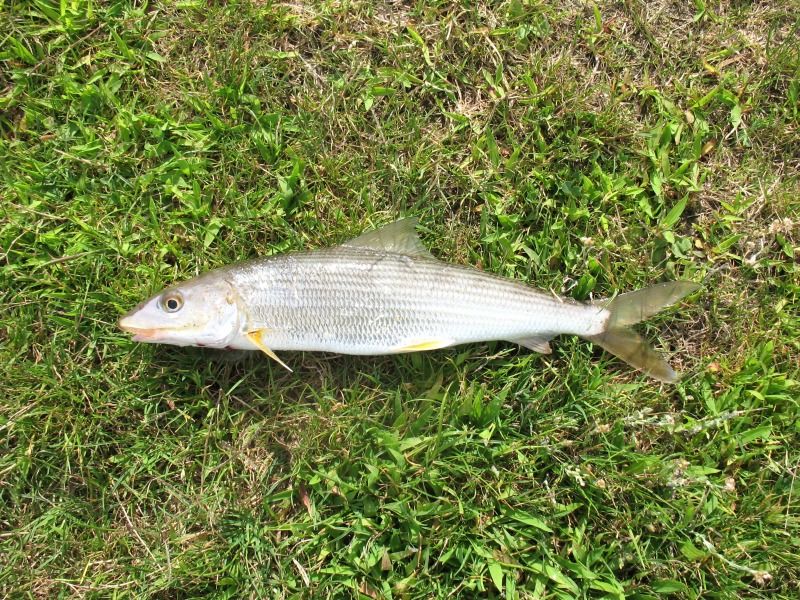
I know that bonefish sometimes travel in a school. So I ran to grab Elijah and told him to cast toward the same spot. Only minutes after Elijah had cast out the rod arched over and the spool was singing! Could it be? Yes it was!!! Bonefish for Elijah too!!!
Now it was Michael’s turn. He cast to the same spot using two rods and set them into my sand spikes. I moved my rod over to his spot and fished with squid. Elijah found a little space in between and tossed out a ghost shrimp. Another 10 minutes passed when Elijah hooked up our third bonefish of the day. In the meantime, I caught another Round Ray and so did Michael.
Elijah was still soaking a ghost shrimp around the area and he his bait was picked up by another bonefish. That’s four bonefish for the group! As if that wasn’t enough, Elijah landed a fourth bonefish soon after. Simply amazing!!!
I was fishing mostly with squid strip hoping to catch one of the Butterfly Rays that I saw coming close to shore. After Elijah caught his 4th bonefish, I switched back to ghost shrimp. Shortly after, Elijah and I had a double header on a Shovelnose Guitarfish and a Thornback Guitarfish. I felt bad for Michael since he was just catch Round Rays and we were catching the other species.
I checked the time and it was around 5pm. We had originally planned to fish the surf with Chris for Leopard Shark, California Moray Eel and Grass Rockfish. However, Chris texted me at around that time to say he had to work. It was a little late to make other plans to fish another location, so we decided to stay at the same spot to give Michael extra time to find his bonefish.
Michael was missing a lot of hits. He was often setting the hook forgetting that the spool was set with a light drag. Elijah and I gave him a few pointers. Finally, Michael had a good run on the rod. We were really hoping this was it…it has to be. Michael was having a ride of this life. When the fish got close, I was almost scared to land it. It was Michael’s first bonefish, and it would not give up. Every time I gently handled the line, the fish would run off. After 3 or 4 tries, I finally had the fish in hand. Michael said he finally realized how hard saltwater fish can run.
We were basically content for the day. Elijah had a 1.5 hour drive home, but we just hung out with a few rods soaking. We were surprised that we haven’t caught any Spotted Bay Bass since anywhere in San Diego Bay has them. We were hoping that Michael could catch one. On one of the very last casts, Michael had a small fish on and he finally checked off the Spotted Bay Bass! Now we were ready to go.
It was just a few hours before that I met Elijah in person for the first time. A few hours later, I was saying goodbye. Even though we only had this short day together, I was glad we had finally met and we would definitely meet again in the future. We were both just waiting for our career to be established and life settle down a little before taking a trip together. Hopefully, it will not be too far away in the future.
This was also Michael’s last day in San Diego as well. He was headed north so he got a ride with Elijah. I wished Michael good luck on this trip north and said we would discuss fall muskie plans when we’re back in Toronot.
I got home just in time when Natasha was starting dinner. Natasha was the daughter in Thomas’ host family. We had some of Thomas’ fried Pacific Jack Mackerel and his marinated Sardines. Yes, we were eating the fresh sardines left from the offshore trip. They are great eating and I don’t understand why people never took the extra bait home to eat, while they buy canned sardines from the store. Strange people…
After dinner, Natasha and I chatted for a bit before Thomas came home. Although I had fished a whole day, I wasn’t really tired. Thomas and I sat there chatting about fishing and Hawaii and time flew. It was 1am all of a sudden and I had to get to bed. I had another early start the next morning.
Aug 12 – Day 17 – The last fishing day…
Wow! It seemed just like a few days ago I arrived in Los Angeles. Time really flies when you are kept busy. This was already my last fishing day.
I had been chatting with Roy for a while and we had exchanged some fishing information in the past. When Roy visited Quebec in the spring, he asked for some fishing information and I provided what I could to help. He caught a number of new species, but most impressively a muskellunge on his own! When he heard I was going to visit San Diego, he said he’ll bring his boat and we can fish San Diego Bay together. We thought it would be a great idea since both of us were looking for our first Eastern Pacific Bonefish. We were inviting two bonefish masters with us today – Phong and Nicky. I had fished with Phong on my visit in 2008. It was Phong who showed me some areas around Mission Bay and helps me catch my first Spotted Bay Bass, Barred Sand Bass and California Halibut. It was great to have a chance to fish with him again…plus his prodigy Nicky.
We met at the boat launch at 6am. My GPS lead me a little off the boat launch, but I did eventually find the right place. We quickly loaded up the boat and Phong backed the boat into the water. Soon, we directed the bow toward the back end of San Diego Bay.
Phong and Nicky had lots of experience fishing on the kayak for these fish. Unlike the typical Bahamas or Belize bonefish experience, these bonefish reside on deeper eel grass flats in 4-6 feet of water. They like to slide up and down from a deeper channel to feed on the flats. When we found the right area, we positioned the boat on the edge of the channel so we could fish toward the deep side and the shallow side.
Similar to yesterday, I was rigged with a Carolina rig and baited with live ghost shrimp that Phong and Nicky had pumped up. Roy, on the other hand, was wielding his fly rod with a sinking line. We quickly sent out bait and put the rod on the rod holder. It is basically a sit and wait game.
Nicky, however, took out a second rod to fish with a plastic grub on the jighead. The Spotted Bay Bass were quick to respond to lure jigged and retrieved over the grass beds. Meanwhile, our ghost shimps and Roy’s fly were largely ignored.
Phong soon joined Nicky using a second rod. At one point, they even took out a crankbait and caught fish on that too. I kept soaking ghost shrimp since I was also hoping to catch a China Croaker or a Smoothhound Shark. I also switched to squid strip for a while to see if it was more attractive for the sharks and rays.
When the Spotties got a little more picky, Nicky tipped the plastic grub with ghost shrimp to keep catching. He certainly had a knack for catching fish.
The adults were not really getting much action. The tide was a little slack without much movement and the bonefish were not feeding. We were actually quite content to just chat and share stories. I guess I was also a little fished out too since I took a rather relaxed attitude toward species hunting. I was mostly just letting a ghost shrimp soak, only checking once in a while when the line was fouled by eel grass.
When Roy put down his fly rod, I asked if I can toss it around. I had cast a sinking line before, but I don’t really have much experience with it. It was nice just getting a few casts on the rod. On my first real cast, I let the fly sank to bottom before starting a strip-pause retrieve. I bounced the fly just above the grass beds when it was hit. The fish was fun on the fly rod, a little stronger than I had thought, since it was a 9” Spotted Bay Bass. We were going to take a picture but the fish jump back to freedom as soon as I unhooked it.
Out of the blue, Phong’s ghost shrimp was hit and there was a good fighter on the line. It was a Yellowfin Croaker. When the tide is right, there are quite a few in the bay, but for today, we only caught one.
Phong stuck again and this was a better fish. He was the shape of a Smoothhound Shark and asked if I want to take the rod to check off another species. I really appreciate the sentiment, but I don’t take hand offs (unless we’re trolling and anyone can take a rod).
I went back to soaking a ghost shrimp since the Smoothhound took a ghost shrimp. Finally, I had a good hit on the rod and set the hook. The fish came flying out of the water and surprised everyone. It was a baby bat ray, a tiny little one, but fun nonetheless on the light rod and light line.
Nicky caught a few more Spotted Bay Bass and it was already 10am. Phong and Nicky had some afternoon plans so they had to leave early. I had a drive back to LA in the afternoon so as much as I would like to continue fishing, I had to call it a morning too.
Roy let Nicky take the wheel for the ride back. Late in the morning, there were much more traffic on the water and at the ramp. We had to watch for other boaters and people on stand-up paddleboard. We waited patiently at the boat ramp for our turn, even to dock the boat so Roy can get the truck. While Roy was away, we were checked by a Game Warden for our catch. We didn’t keep any fish so there was nothing to check. We also chatted with a girl taking a catch census while we were preparing to wash down the boat.
After washing down the boat, Phong and Nicky had to go. Before we left, we took a group shot.
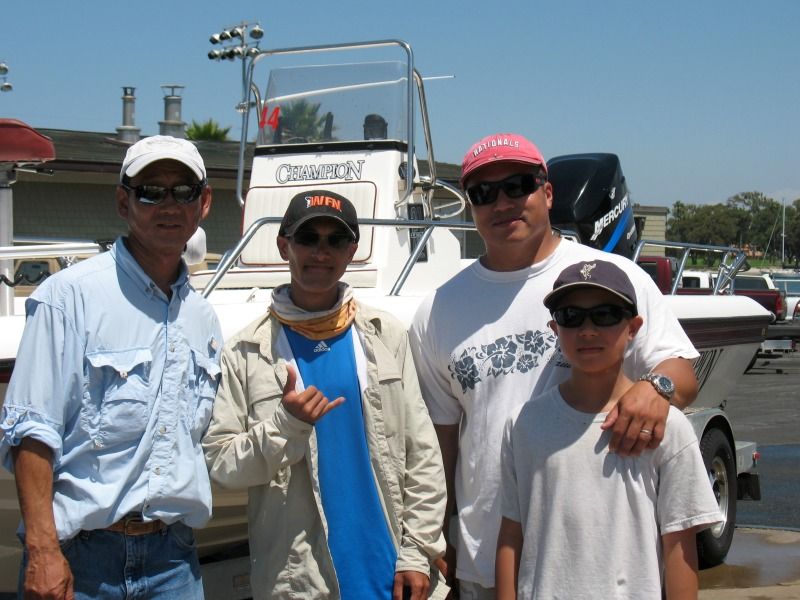
It was a really great time fishing with all three of them. It was the perfect way to spend my last fishing trip with some great friends just to enjoy time of the water. I hope we could do it again on my next trip.
I texted Thomas to let me know I was done fishing. Thomas wanted to have lunch with me before I drive back to LA. We had Pho and he wouldn’t let me pay. Even off the islands, Thomas kept all that aloha with him. Thanks for everything Thomas, from offering a place to stay to hooking up some boat trips with your friends to all the lunches and dinners you treated me too. That’s some hospitality I would love to repay in the future.
After lunch, I went back to take a nap before leaving. Just after packing the car, Thomas and I took a picture together in front of the gorgeous saltwater reef tank that was at his house.
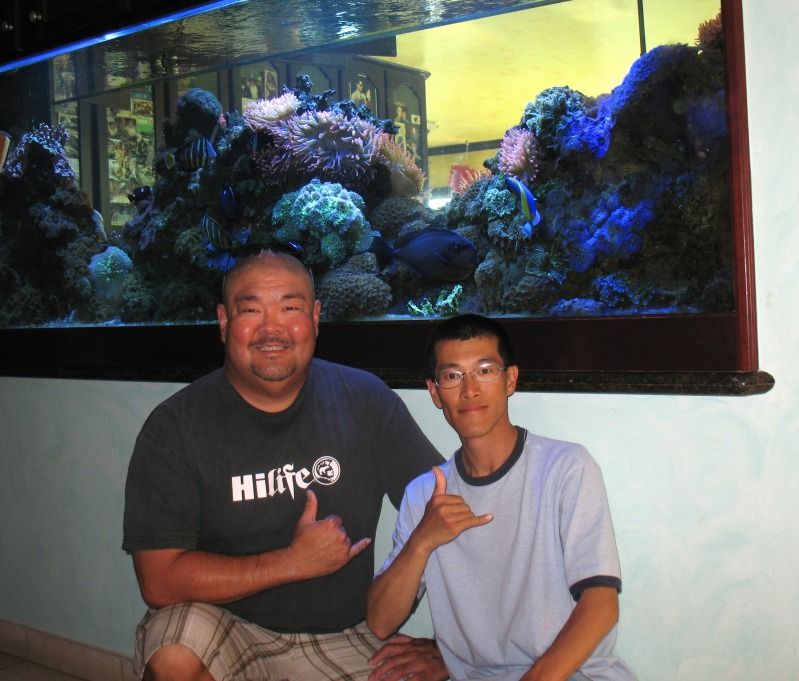
Before I left, Thomas gave me a chunk of yellowtail and some dried Jack Mackerel to bring back to my aunt. He packed them with ice so they would keep fresh for the ride back. It was good there were extra ice since I was stuck in traffic due to two accidents. It took me 3.5 hours to drive back to LA on a Sunday!
When I finally arrived back to my aunt’s apartment, it was close to dinner time. I cut some yellowtail for sashimi and we also have the dried Jack Mackerel. Anthony ordered a lobster from this restaurant so we had a great seafood dinner!
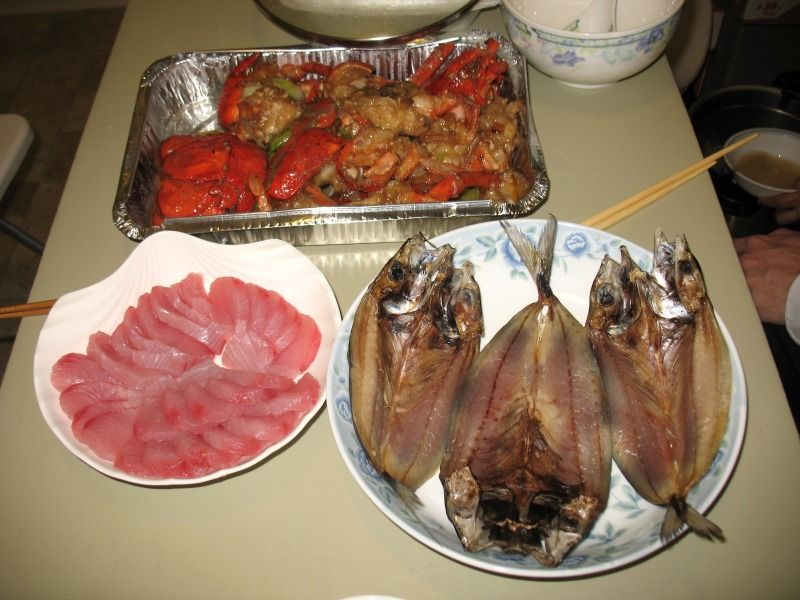
After dinner, I stayed up a little bit to pack some luggage. When I was packing, I felt a little series of earthquake. I’m sure most Californians were used to small earthquakes. It was just a little unsettling for me LOL. Apparently, more earthquakes can occur during hot weather. It was been a few hot days.
Aug 13 – Day 18 – Headed home.
I spent most of the morning packing. When I was fishing, I tended to just toss gear and tackle randomly in the car. There was a lot of reorganizing to make things fit again. Most importantly, I had to watch the weight restriction for my checked baggage.
My aunt and I went out for a quick breakfast before returning the rental car at noon. We had just enough time to have lunch with Anthony before I did some last minute packing. My flight was to depart at 10pm, but we played it safe and I got to the airport at 7pm. We took one last picture at the airport.

Apparently, there were some sort of flight delay on another flight and we had extra passengers on my flight to Toronto. The plane still had a few empty seats and I was one of the lucky few to have an empty seat next to me. It was a pretty comfortable red eye flight back to Toronto, but I didn’t get much sleep.
When I arrived back in Toronto, I was looking for my rod case. I usually have to get my rod case from the oversized baggage area, but my rod case wasn’t there. This was not the first time my rod case was lost. Luckily, this was at the end of my trip and not the beginning of it! A day later, they did deliver my rods to my apartment and all the rods were intact. Otherwise, it could have put a sour end to such an exceptional trip.
From the start to the end, this trip was nothing short of a huge success. Yeah, the fishing was exceptionally productive (43 new species in 17 days, 47 species in total!), but it was really all the people I had to chance to meet and share time on the water that made it very worthwhile. It was a great opportunity to see my friends’ microscopy facilities and had a better understanding of their job responsibilities. It has been a few years since I’ve visited my aunt and cousin and it was great to spend some time with them again. This trip was one to remember for a long time…and it would be very hard to beat!




mateusz
Posts: 207
Date Joined: 18/03/11
awesome
thanks for the reports, always a good read. 43 species in 17 days is an awesome effort, how many life-time species is it now then?
matt
beached as bro!
KenTse
Posts: 139
Date Joined: 23/11/10
Thanks Matt. I'm up to 273
Thanks Matt. I'm up to 273 life-time species...plus a couple of subspecies and one white crappie/black crappie hybrid.
aalfred
Posts: 669
Date Joined: 13/06/09
Nice
Great report and pics in all of the reports mate! Thanks for sharing
pricey10
Posts: 486
Date Joined: 07/01/12
Interesting report! Thanks
Interesting report! Thanks for sharing
Karratha. WA
meglodon
Posts: 5981
Date Joined: 17/06/10
thank you for sharing
great read and pics
Adam Gallash
Posts: 15659
Date Joined: 29/11/05
Boney
Well done on the boney ken, quality catch. Thanks for the detailed reports as well!!
Site Admin - Just ask if you need assistance
Lamby
Posts: 3145
Date Joined: 04/08/09
Great read & pics, thanks for
Great read & pics, thanks for sharing!
All I need is for tiimmbo to get married over in the states again so I can get to California, great holiday
KenTse
Posts: 139
Date Joined: 23/11/10
If you ever go to California,
If you ever go to California, this fishing forum is a great one to read and ask questions. It's not uncommon to even have members meet up and fish with you. The friends that I met in California were all from this forum.
www.scsurffishing.com
I'm always on that forum (even though I don't live in California) and my name is KenT on there.
bitten
Posts: 803
Date Joined: 07/04/10
nice bone fishbut i think you
nice bone fish
but i think you need to come back to oz no rock fish here
KenTse
Posts: 139
Date Joined: 23/11/10
Hahaha. I love rockfish
Hahaha. I love rockfish actually. Their biodiversity is so great! But you are right, I do need to take a serious trip to Oz. Last time I only had 3.5 days total...all in Perth. I would love to take a 3 week trip to visit different corners of Oz in the future.
chookc
Posts: 442
Date Joined: 07/01/10
mate you'll need more than 3
mate you'll need more than 3 weeks to do oz.... if youy want to fish all the diverse regions
KenTse
Posts: 139
Date Joined: 23/11/10
I'd like to have more than 3
I'd like to have more than 3 weeks in Oz...but life and work does not permit...
Now...If I can only find a job in Oz...